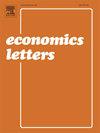Unpacking economic mobility: The short- and long-term impacts of trade liberalization
IF 2.1
4区 经济学
Q2 ECONOMICS
引用次数: 0
Abstract
Trade liberalization impacts economic growth, inequality, and mobility, typically examined separately. By breaking down absolute economic mobility into these three areas, we explain how each component contributed to real per-capita expenditure changes due to tariff reductions. Using Indonesia's IFLS data, we connect individuals over the short term (1993–2000) and father-son pairs over the long term (1993–2014). Our analysis also considers if non-coresident father-son pairs behaved differently relative to coresident pairs. Further, we explore if the economically vulnerable segments were able to participate in the overall patterns experienced by the economy. We find that tariff reductions fostered absolute economic mobility of real per-capita expenditures by promoting regional growth, reducing inequality, and enhancing relative economic mobility, particularly benefiting the individuals and households in the lowest quartile. Over time, regional disparities in the effects of tariff cuts diminished as regions converged.
求助全文
约1分钟内获得全文
求助全文
来源期刊

Economics Letters
ECONOMICS-
CiteScore
3.20
自引率
5.00%
发文量
348
审稿时长
30 days
期刊介绍:
Many economists today are concerned by the proliferation of journals and the concomitant labyrinth of research to be conquered in order to reach the specific information they require. To combat this tendency, Economics Letters has been conceived and designed outside the realm of the traditional economics journal. As a Letters Journal, it consists of concise communications (letters) that provide a means of rapid and efficient dissemination of new results, models and methods in all fields of economic research.
 求助内容:
求助内容: 应助结果提醒方式:
应助结果提醒方式:


